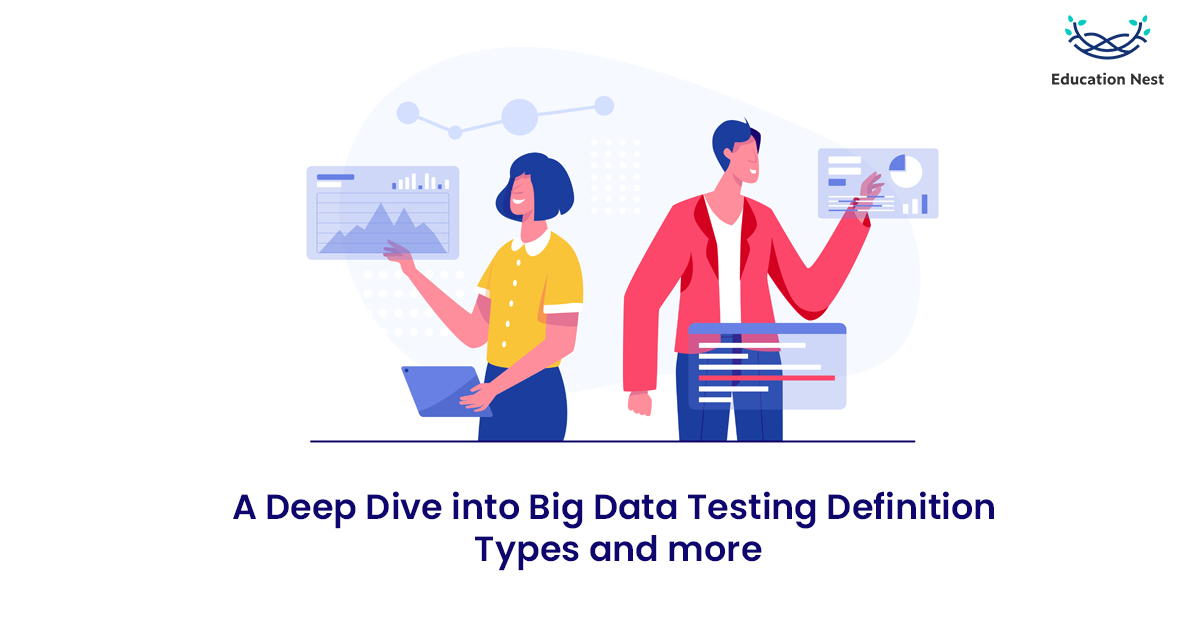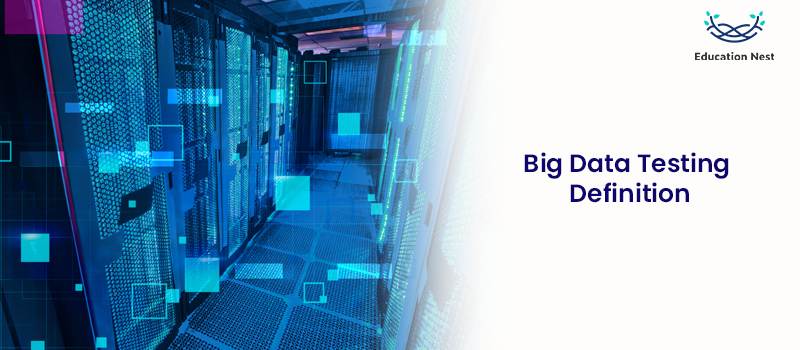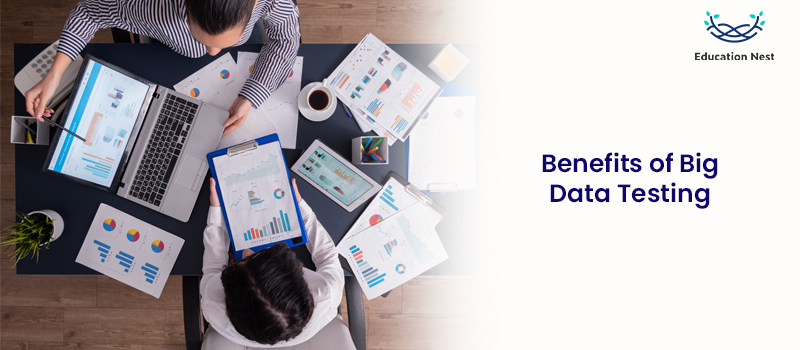
Businesses in the modern day are always on the lookout for new methods to harness the potential of Big Data testing to gain a strategic edge and make better choices. The massive amount of raw data containing helpful information has to be designed and tested thoroughly to provide the desired results in applications. With the increased quantity of big data testing tools, rigorous testing has become necessary. Data quality assessment (QA) is known as “big data testing.” Database, infrastructure, performance, or functionality testing may all be included.
In this post, we’ll break down the various approaches to big data testing and explain the terminology used in the field.
Big Data Testing: Definition

- Big data testing is the process of putting an extensive data application through its paces to ensure it performs as intended.
- The purpose of big data testing aims to ensure a big data system’s integrity, performance, and safety under stress.
- Big data refers to a variety of data collections that are too enormous to be handled by conventional computer methods.
- Different methods, tools, and frameworks are required to test these datasets.
- It is the process of examining and validating the functioning of a big data application.
- Big Data represents a collection of data that exceeds the capabilities of typical computer techniques in volume, diversity, and velocity levels.
- In addition, unique testing methods, exceptional frameworks, creative strategy, and an array of tools would be required to test the datasets.
- Data must be thoroughly tested to guarantee the system’s efficacy, performance, and security.
When we talk about “big data,” we’re referring to the collection, organisation, storage, and analysis of enormous, varied, and quickly changing datasets.
Benefits of Big Data Testing:

The following are the benefits of big data testing-
- Accuracy of Data
- Right Data is available at Right Time
- Storage is cost-effective
- Reduction of deficit and increase in revenue
- Improved decision-making skills
You Must Watch: Big Data Decoded: An In-Depth Guide to the 5 V’s
Various Types of Big Data Testing

Big Data Testing is classified into four types-
- Architecture Testing:
Data processing is tested this way to ensure it is correct and up to snuff with what the company needs. Furthermore, if the design is flawed, it might lead to a drop in speed, which could cause data processing interruptions and even data loss. For this reason, it is crucial to validate your architecture before launching a Big Data project.
- Database Testing:
Database testing, as the name implies, is performed by verifying information obtained from databases. Correct and accurate information from the cloud or local databases is checked for accuracy.
- Performance Testing:
Its purpose is to guarantee that large data applications run well by measuring their load times and processing speeds. This test helps determine how quickly different databases and warehouses produce information. It tests the crucial parts of the big data application even more by putting them through various stress tests.
- Functional Testing:
A lot of testing needs to be done at the API level for large-scale data applications that combine operational and analytical features. All the modules, scripts, programs, and tools involved in archiving, importing, and processing applications are tested.
Lastly, let’s briefly discuss the different types of big data testing tools.
Types of Big Data Testing Tools
Unless you have reliable testing tools, your QA testers will not get the benefits of big data validation. When planning a testing approach, this big data testing tutorial advises considering the following top-rated big testing tools:
Hadoop:
Most professional data scientists agree that this open-source framework is essential to a promising technology stack. Hadoop can store vast amounts of data of many different types and run many jobs thanks to its powerful computing resources. Have your QA team analyse the performance of Hadoop using Java-savvy testers who can look at a lot of data.
HPCC:
High-Performance Computing Cluster describes this open-source program as a comprehensive answer for big data applications. The design of HPCC’s supercomputing platform supports data parallelism, pipeline parallelism, and system parallelism. This leads to high testing performance. Make sure the QA engineers are fluent in C++ and ECL.
Cloudera:
Cloudera, also called CDH (Cloudera Distribution for Hadoop), is an excellent platform for large-scale testing technology deployments. Free platform distribution is provided by this open-source technology, which incorporates Apache Impala, Apache Hadoop, and Apache Spark. Cloudera can be deployed quickly, boasts strong security and control, and enables teams to collect, process, administer, manage, and share unlimited data with no effort.
Cassandra:
Cassandra is the big data testing platform of choice for major corporations. This open-source software has a robust, distributed database that can manage large volumes of data using inexpensive servers. Cassandra is one of the most reliable ways to test large amounts of data because it automatically replicates, scales linearly, and doesn’t have a single point of failure.
Storm:
This open-source, no-cost testing tool works with any language and can analyze large, unstructured data sets in real-time. The storm is fault-tolerant, scalable, and secure and can handle massive amounts of data with no problems. This cross-platform technology can be used for many things, like log analysis, real-time insights, machine learning, and continuous computing.
Lastly, comprehensive testing of large data sets requires specialist expertise to get reliable findings within the specified budget and timeline. The best ways to test big data apps are only available if you have an in-house or outsourced team of QA experts with a lot of experience testing big data.

